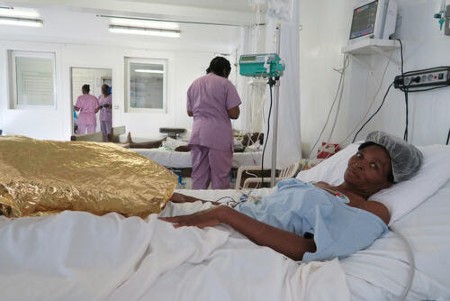PORT AU PRINCE, Haiti – More than a month after it was forced to shut down its operations when gunmen entered its hospital in Tabarre, Médecins Sans Frontières (MSF) announced that it had resumed its activities in Haiti.
 (Photo courtesy of MSF) Tabarre is an urban commune located in the capital, Port-au-Prince, and on July 7, at least 20 armed men entered the MSF hospital, forcibly taking away a patient who had been shot and who was still in the operating room.
(Photo courtesy of MSF) Tabarre is an urban commune located in the capital, Port-au-Prince, and on July 7, at least 20 armed men entered the MSF hospital, forcibly taking away a patient who had been shot and who was still in the operating room.
The hospital’s burns and outpatient care departments reopened a few days later, but the hospital did not resume admissions for trauma patients until Monday.
The MSF said that the invasion of its hospital in July was the latest example in a series of violent incidents that forced MSF to either close or temporarily suspend activities in several facilities in Port-au-Prince.
In January, MSF said it was forced to end its support to the Raoul Pierre Louis Hospital , while another MSF hospital in Cité Soleil has suspended activities repeatedly due to frequent gunfire in the vicinity. It is now operating at reduced capacity.
“We are pleased to resume all activities and be at the service of the public once again. The decision to suspend activities was difficult, given the vital role of this hospital in meeting medical needs in Port-au-Prince.
“But the decision to re-open was difficult as well because there is no place for violence or weapons inside a medical facility. What happened in July is absolutely unacceptable. We will not be able to work unless the patients and health professionals are respected,” said Mumuza Muhindo, MSF Head of Mission.
Muhindo said that MSF is committed to Haiti and its people “and that’s why we continue to have discussions with all stakeholders and armed groups, including law enforcement forces, to ensure that the conditions allow us to continue our services and work safely in Tabarre.
“Our message to everyone carrying a weapon in Haiti is clear, that respect for health facilities, patients, and staff is non-negotiable. The survival of the Tabarre hospital will depend on everyone abiding by this,” the MSF official said.
Muhindo said that MSF has been working in Haiti since the early 1990s and has been one of the main players in the response during acute crises such as the 2010 earthquake and the cholera epidemic from 2010.
“Its current activities in Haiti cover trauma and medical emergencies, burns, sexual violence, mother and child care and general consultations.”


